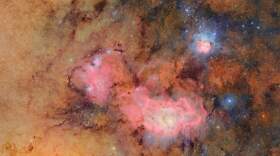-
Snow isn't always white; algae can make it look green, red, or orange, and scientists are trying to understand how and why these colorful patches appear.
-
Researchers studying the human brain shared a lot of fascinating research this year, like how to keep brains young and how to reduce inflammation in joints.
-
Snow isn't always white; algae can make it look green, red, or orange, and scientists are trying to understand how and why these colorful patches appear.
-
Organoids are bits of neural tissue that model human brain development. Their use in science makes some uneasy, in part because the brain is so closely tied to our sense of self.
-
Emily Kwong and Berly McCoy of NPR's Short Wave talk about why swearing might improve physical performance, how birds' bills changed during the pandemic and why scientists are sampling whale breath.
-
Blue spotted salamanders have been seen walking across snow and new research suggests how they get by in the cold.
-
A new telescope equipped with the world's largest digital camera will collect more astronomical data in a single year than all others combined.
-
Former President Gerald Ford signed the Metric Conversion Act 50 years ago. However, he did not make metric adoption mandatory, and the efforts fell flat.
-
Scientists have developed an experimental way to study how human embryos implant in a uterus, which may provide new insights into why miscarriages occur and how they can be prevented.
-
Trump administration officials say changes to federal agencies engaged in science were made in the interests of better science that benefits more Americans. Many scientists we spoke with disagree.
-
Officials said the error is likely too minute for the general public to clock it, but it could affect applications such as critical infrastructure, telecommunications and GPS signals.
-
Researchers retrieved reef monitoring devices that had been placed in deep coral reefs in Guam. The devices were placed up to 330 feet below the surface.








